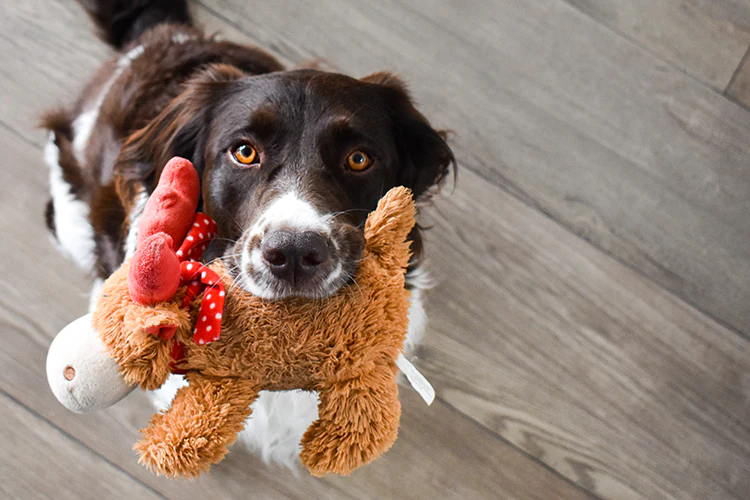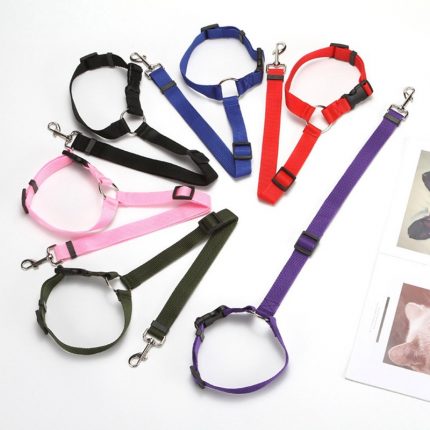Why Does My Dog Chew His Toys on Me?
Dogs are known for their playful nature and their love for chewing on toys. However, if you’ve ever experienced the peculiar behavior of your furry friend choosing to chew their toys on you, you might be left wondering why they engage in such behavior. In this article, we will delve into the possible reasons behind this puzzling habit and explore the various factors that could contribute to your dog’s desire to chew their toys on you.
One possible explanation for this behavior is that your dog sees you as a source of comfort and security. Dogs are social animals, and they often seek reassurance and companionship from their human counterparts. By choosing to chew their toys on you, your dog may be seeking proximity and seeking solace in your presence. This behavior could be an indication of their trust and reliance on you as their primary caregiver.

Another reason for this behavior could be related to your dog’s natural instinct to protect and guard their possessions. Dogs have an innate need to establish boundaries and mark their territory. By chewing their toys on you, your dog might be displaying their ownership over their toys and asserting their dominance. This behavior could be more prevalent in dogs that have not undergone proper training or socialization.
Additionally, chewing toys on you could be a form of attention-seeking behavior. Dogs are highly perceptive creatures and often learn that certain actions garner attention from their owners. If your dog has learned that chewing their toys on you elicits a response or interaction, they may continue to engage in this behavior to gain your attention, even if it is negative attention.
It is important to note that the underlying reasons for this behavior may vary from dog to dog. Factors such as breed, age, past experiences, and individual personality traits can all play a role in shaping your dog’s behavior. Understanding the motivations behind this behavior can help you address it effectively and provide appropriate solutions to redirect their chewing habits.
In the following sections, we will explore practical recommendations and strategies to manage and modify this behavior. By implementing these recommendations, you can help your dog develop healthier chewing habits and strengthen the bond between you and your furry companion.
The Reasons Behind Dogs Chewing Their Toys on Their Owners
1. Seeking Comfort and Security
One possible reason why dogs choose to chew their toys on their owners is because they see them as a source of comfort and security. Dogs are pack animals by nature and often seek solace in the presence of their human companions. Chewing toys on their owners may provide them with a sense of reassurance and closeness, as they feel safe and protected in the company of their trusted caregiver.
2. Establishing Dominance and Marking Territory
Another explanation for this behavior is related to a dog’s natural instinct to establish dominance and mark their territory. By chewing their toys on their owners, dogs may be asserting their ownership over their possessions and displaying their dominance. This behavior is more common in dogs that have not undergone proper training or socialization, as they may not understand appropriate boundaries.
3. Attention-Seeking Behavior
Chewing toys on their owners can also be a form of attention-seeking behavior displayed by dogs. Dogs are highly perceptive and quickly learn that certain actions elicit responses from their owners. If a dog realizes that chewing their toys on their owner gains attention, even if it is negative attention, they may continue to engage in this behavior as a means of seeking interaction and stimulation.
4. Boredom and Excess Energy
Boredom and excess energy can also contribute to a dog’s tendency to chew their toys on their owners. Dogs require mental and physical stimulation to stay happy and content. If a dog does not receive sufficient exercise or mental enrichment, they may resort to chewing on toys as a way to alleviate boredom or burn off excess energy. Chewing on their owners may provide an additional outlet for their pent-up energy.
5. Separation Anxiety
Dogs with separation anxiety may exhibit destructive behaviors, including chewing on toys on their owners. When dogs experience distress or anxiety when separated from their owners, they may seek comfort by chewing on objects that carry their owner’s scent. Chewing on their owners can be a way for them to feel closer and alleviate their anxiety.
Conclusion
In conclusion, understanding the behavior of why your dog chooses to chew his toys on you can strengthen the bond between you and your furry companion. For more insights and tips on addressing this behavior, visit GeePets.com, where you can find a wealth of resources on dog behavior and training.

Additionally, exploring external resources like The American Kennel Club can offer further guidance on managing and understanding your pet’s habits. Both these platforms provide valuable information to help you navigate the quirks of pet ownership, ensuring a happy and healthy relationship with your dog.
Practical Recommendations to Address Dogs Chewing Their Toys on Their Owners
1. Provide Appropriate Chew Toys
Offer a variety of chew toys that are specifically designed for dogs. Opt for toys made of durable materials, such as rubber or nylon, that can withstand vigorous chewing. Interactive toys, such as treat-dispensing toys or puzzle toys, can also help keep your dog mentally stimulated and reduce their desire to chew on you.
2. Encourage Positive Chewing Habits
Redirecting your dog’s chewing behavior involves actively engaging them in appropriate chewing activities, especially if you’re pondering, “Why does my dog chew his toys on me?” Whenever you catch your dog chewing on their toys, it’s crucial to praise and reward them with treats or verbal praise. This approach of positive reinforcement will help them understand that chewing on their toys is desirable behavior, directly addressing the question, “Why does my dog chew his toys on me?”
By consistently rewarding them when they choose their toys over anything else, you’re not only encouraging good behavior but also providing an answer to the query, “Why does my dog chew his toys on me?” This method ensures that your dog associates the act of chewing their toys with positive outcomes, gradually minimizing the chances of you wondering, “Why does my dog chew his toys on me?” Through persistence and consistent application of these strategies, your dog will learn the appropriate outlets for their chewing instincts, making the question “Why does my dog chew his toys on me?” a thing of the past.
3. Establish Boundaries and Consistency
To address the question, “Why Does My Dog Chew His Toys on Me,” it’s crucial to set clear boundaries for your dog’s chewing behavior. Teaching them the “leave it” or “drop it” command can significantly discourage them from choosing you or inappropriate objects as their chewing targets. Consistency in enforcing these commands is key to redirecting their attention away from you and towards their toys whenever they exhibit unwanted chewing behavior.

Understanding “Why Does My Dog Chew His Toys on Me” can also lead to better management of their habits. Every time your dog decides to chew his toys on you, see it as an opportunity to reinforce these commands. This practice not only answers the “Why Does My Dog Chew His Toys on Me” concern but also strengthens your dog’s obedience and respect for boundaries.
Moreover, the frequent thought of “Why Does My Dog Chew His Toys on Me” suggests the need for more interactive playtime with toys that are meant for chewing. Offering a variety of chew toys can keep their interest and reduce the chances of them returning to chew on you. Each moment they choose a toy over you, it’s a step forward in addressing the “Why Does My Dog Chew His Toys on Me” issue, emphasizing the importance of patience and persistent training in reshaping their chewing preferences.
4. Provide Sufficient Exercise and Mental Stimulation
5. Address Separation Anxiety
If your dog’s chewing behavior, often manifested as “Why Does My Dog Chew His Toys on Me,” is triggered by separation anxiety, work on gradually desensitizing them to being alone. Start with short periods of separation and gradually increase the duration over time. This approach helps address the root cause of “Why Does My Dog Chew His Toys on Me,” by easing the stress associated with your absence.
Our featured products:
Providing them with comfort items, such as blankets or clothing with your scent, can help alleviate their anxiety when you are not around, potentially reducing instances of “Why Does My Dog Chew His Toys on Me.” Incorporating these items serves as a soothing reminder of your presence, making the periods of separation less daunting and addressing the concern of “Why Does My Dog Chew His Toys on Me” by offering a sense of security and familiarity. This methodical approach to mitigating separation anxiety can significantly diminish the behavior behind “Why Does My Dog Chew His Toys on Me,” fostering a calmer, more contented pet.
6. Seek Professional Guidance
If your dog’s chewing behavior persists or becomes a cause for concern, it is advisable to seek guidance from a professional dog trainer or veterinarian. They can assess the underlying causes of the behavior and provide tailored solutions to address it effectively. They may recommend behavior modification techniques or suggest additional interventions to help redirect your dog’s chewing habits.
Remember, patience and consistency are key when addressing unwanted chewing behavior. By implementing these practical recommendations and understanding the motivations behind your dog’s behavior, you can help them develop healthier chewing habits and strengthen the bond between you and your furry companion.















